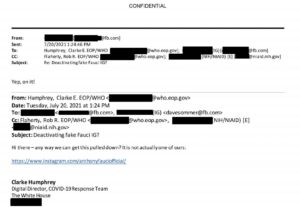Fox’s Tomi Lahren Slams Instagram for Taking Down Fake Fauci Account at the White House’s Request, But Was It Really ‘Censorship’?
Tomi Lahren accused Big Tech of “colluding with the Democrat Party to censor us conservatives” regarding an email from a Biden White House official to Instagram, complaining about a fake account that had been set up using the name of Dr. Anthony Fauci, but the problem with the account seems more likely to have been the impersonation of the National Institute of Allergy and Infectious Diseases director rather than any intention to “censor” parody content.
Lahren introduced a segment on The Big Sunday Show by bringing up a motion filed in federal court by Attorney General Jeff Landry (R-LA) and Attorney General Eric Schmitt (R-MO), seeking to compel the Department of Justice to release communications between Biden administration officials and major social media companies.
The attorneys general accused the White House and Big Tech of operating what they call a “Censorship Enterprise,” and one key allegation relates to a July 20, 2021 email from Clarke Humphrey, the Covid-19 Response Team Digital Director, to an employee of Instagram’s parent company Meta.
“Democrats talked a whole lot about collusion when it came to Trump,” said Lahren, but “now the real collusion looks like it’s between Biden and Big Tech.”
One example, Lahren continued, was when “the White House Digital Director asked Instagram to remove a parody account that made fun of Dr. Fauci” and “less than a minute later” got a response of “Yep, on it!”
The show then aired a clip of Tucker Carlson interviewing Schmitt on Thursday, in which the attorney general said this was a case of “censoring and silencing Americans” and “ought to shock every American.”
“Censoring and silencing Americans!” Lahren remarked after the clip aired. “I had no idea that Big Technology was colluding with the Democrat Party to censor us conservatives,” she said sarcastically. “This does not shock me one bit.”
Lahren was mirroring similar language used by Schmitt on his website, which stated “A White House official was even concerned about parody Fauci accounts and coordinated with FB to take them down,” along with a link to the below screenshot of the email, with contact information redacted.
The subject line was “Deactivating fake Fauci IG?” and the text read as follows:
Hi there — any way we can get this pulled down? It is not actually one of ours:
https://www.instagram.com/anthonyfauciofficial/
Fauci’s work as NIAID director and the head of the federal government’s Covid task force has made him a target of criticism, mockery, harassment, and even death threats. So it’s important to consider, was this really a case of the White House bringing down the hammer of federal government power to smite someone posting jokes online about Fauci — or was it an effort to prevent a fake account impersonating the doctor from posting information that could mislead people or incite further harassment and threats to be directed his way?
It should be noted that the email from Humphrey never mentioned any of the anthonyfauciofficial account’s content, complaining only about the account being “fake” and “not actually one of ours,” despite being labeled an “official” account.
That link to an “anthonyfauciofficial” account now brings up an error message, “Sorry, this page isn’t available. The link you followed may be broken, or the page may have been removed.” Searching the Wayback Machine internet archives only brings up site captures taken after the account was taken down, so there’s no information available on what content the account may have been posting.
The issue of accounts pretending to be celebrities, elected officials, and political candidates is a real and ongoing challenge for both the people being impersonated and the social media platforms, and seeking to have such impersonation content removed is not the same as “censorship.”
Instagram’s terms of service take impersonation so seriously that it is the very first rule they list among the prohibited activities on their platform:
How You Can’t Use Instagram. Providing a safe and open Service for a broad community requires that we all do our part.
You can’t impersonate others or provide inaccurate information.
You don’t have to disclose your identity on Instagram, but you must provide us with accurate and up to date information (including registration information), which may include providing personal data. Also, you may not impersonate someone or something you aren’t, and you can’t create an account for someone else unless you have their express permission.
I was the digital communications director for a campaign in 2016 and discovered a fake Facebook account that had been created pretending to be my candidate, stealing multiple photos and text we had posted for several weeks to create the impression it was the real thing. The week of the election, the fake account published a post claiming my candidate was dropping out of the race and endorsing his opponent. I emailed the contact I had at Facebook to report the fake account and it was taken down.
If it had been merely criticizing or mocking my candidate, I can’t find anything in the Facebook terms of service that would have justified taking it down, and I would never have made that request. But this was an account that was deceitfully pretending to be my candidate and had posted malicious and inaccurate information intended to harm the campaign and sow confusion.
Parody accounts are fun; I follow several on Twitter myself. That doesn’t seem to be what happened here.
Watch the video above, via Fox News.







